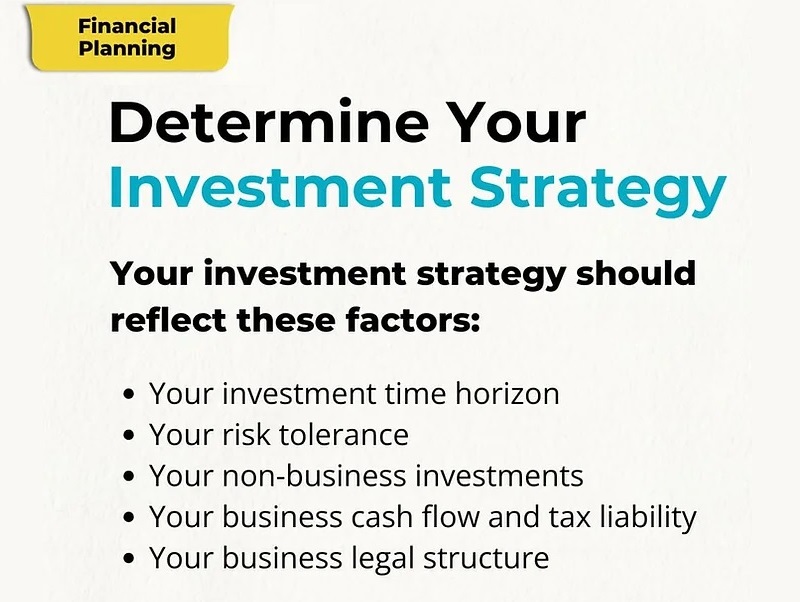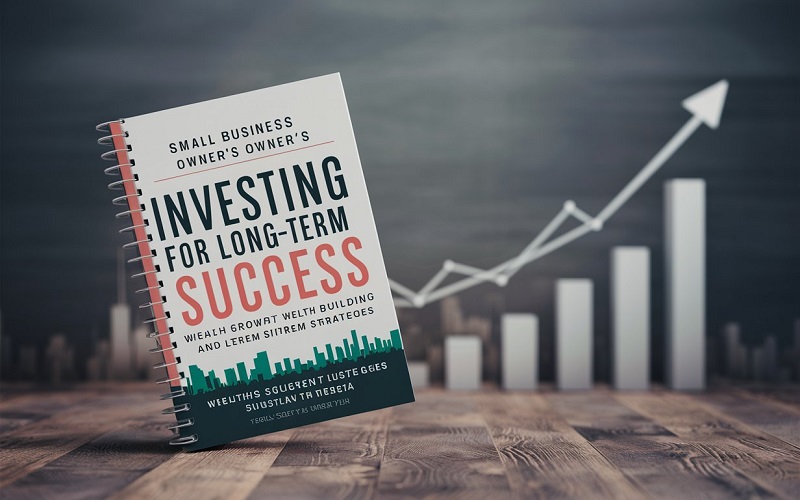
5 Financial Planning Tips to Help Your Small Business Thrive
December 31, 2024Building wealth as a small business owner requires not only entrepreneurial skill but also a solid investment strategy. While running a business often consumes most of your time and resources, setting aside funds to grow through investing can set you on a path toward financial security and long-term success. This comprehensive guide explores how small business owners can leverage smart investment strategies to grow their wealth and ensure the sustainability of their enterprises.
Understanding the Importance of Investing for Business Owners
Running a small business is inherently risky, but diversification through investing can help mitigate financial uncertainties. Investments act as a financial safety net, ensuring that your wealth grows even when business conditions are unfavorable. Furthermore, reinvesting profits wisely can accelerate your company’s expansion.
Key Benefits of Investing:
- Financial Security: Protect against market downturns and unforeseen business challenges.
- Wealth Growth: Achieve long-term financial goals through compound returns.
- Passive Income: Generate income streams outside your core business operations.
Setting Clear Financial Goals
Before jumping into investments, define your financial goals. Are you looking to save for retirement, expand your business, or build an emergency fund? Clear objectives help in choosing the right investment vehicles and strategies.
Steps to Set Financial Goals:
- Assess Your Current Finances: Understand your income, expenses, and available capital.
- Define Short-term and Long-term Goals: Break down objectives into manageable timeframes.
- Establish a Budget for Investments: Allocate a percentage of profits for investing.
Educating Yourself About Investment Options
Investing offers a plethora of opportunities, each with its own risk and reward profile. Knowing the basics is essential for making informed decisions.
Popular Investment Options for Small Business Owners:
- Stocks and Bonds: Ideal for long-term wealth building.
- Mutual Funds and ETFs: Diversified and professionally managed portfolios.
- Real Estate: Tangible assets that can generate rental income and appreciate in value.
- Retirement Accounts: Options like IRAs and 401(k)s offer tax advantages.
- Peer-to-Peer Lending: A way to earn interest by funding other entrepreneurs.
- Cryptocurrency: A high-risk, high-reward option for tech-savvy investors.
Balancing Risk and Reward
Every investment comes with a degree of risk. As a small business owner, your appetite for risk should align with your financial goals and business priorities.
Risk Management Tips:
- Diversify Your Portfolio: Avoid putting all your money into one asset.
- Stay Informed: Monitor market trends and economic indicators.
- Invest Gradually: Use strategies like dollar-cost averaging to minimize risks.
Creating an Investment Budget
Allocating funds for investments can be challenging, especially for small businesses operating on tight margins. However, disciplined budgeting is key to success.
How to Allocate Funds for Investments:
- Reinvest Business Profits: Allocate a portion of your earnings toward investments.
- Cut Non-Essential Expenses: Free up cash by streamlining operations.
- Set Up Automatic Transfers: Automate contributions to investment accounts.
Building a Balanced Investment Portfolio
A well-balanced portfolio includes a mix of asset classes to achieve steady growth while minimizing risk.
Portfolio Composition for Business Owners:
- Conservative Approach: 60% bonds, 30% stocks, 10% cash.
- Moderate Approach: 50% stocks, 30% bonds, 20% real estate.
- Aggressive Approach: 70% stocks, 20% bonds, 10% alternative investments.
Leveraging Tax-Advantaged Accounts
Tax-efficient investing can significantly boost your wealth over time. Leverage accounts that offer tax benefits tailored to business owners.
Best Tax-Advantaged Accounts:
- SEP IRA: Perfect for self-employed individuals.
- Solo 401(k): Provides high contribution limits for entrepreneurs.
- Health Savings Account (HSA): Offers triple tax advantages.
Understanding Business-Related Investments
Investing directly into your business can yield significant returns. This includes upgrading equipment, improving marketing strategies, and hiring skilled personnel.
High-Impact Business Investments:
- Technology Upgrades: Increase productivity and customer satisfaction.
- Employee Development: Improve team performance through training.
- Marketing Campaigns: Attract more customers and boost revenue.
Exploring Passive Investment Opportunities
Passive income streams reduce reliance on active business income. These investments can stabilize cash flow and provide long-term wealth.
Examples of Passive Investments:
- Dividend Stocks: Earn regular payouts from profitable companies.
- Real Estate Rentals: Generate income through tenants.
- Index Funds: Low-maintenance, diversified investment options.

Hiring a Financial Advisor
While self-education is valuable, consulting a financial advisor can provide personalized guidance tailored to your business and financial goals.
When to Hire an Advisor:
- If you’re unfamiliar with investment strategies.
- To manage a complex portfolio.
- To create a succession or retirement plan.
Monitoring and Adjusting Your Investment Strategy
Regularly reviewing your portfolio ensures that your investments align with changing goals and market conditions.
How to Monitor Effectively:
- Review performance quarterly or annually.
- Rebalance your portfolio as needed.
- Stay updated on tax laws and market changes.
Avoiding Common Investment Pitfalls
Investing requires caution and strategic planning. Avoiding common mistakes can save you from unnecessary losses.
Common Mistakes:
- Overinvesting in One Asset: Leads to unnecessary risk.
- Ignoring Fees: High fees can erode returns over time.
- Chasing Trends: Following market hype often results in poor outcomes.
The Role of Emergency Funds in Investing
An emergency fund acts as a buffer, preventing the need to liquidate investments during unforeseen situations. Aim to save at least 3-6 months’ worth of expenses.
Planning for Retirement
As a business owner, retirement planning often takes a backseat. However, early planning ensures a comfortable future.
Steps to Plan for Retirement:
- Open a retirement account (e.g., SEP IRA, Solo 401(k)).
- Contribute regularly and increase contributions with time.
- Diversify your retirement investments.

Measuring Success and Celebrating Milestones
Track the progress of your investments to understand their impact on your wealth and business growth. Celebrate milestones to stay motivated and committed to your financial goals.
Key Performance Indicators:
- Annual portfolio growth rate.
- Business revenue increases from reinvestments.
- Achievement of financial goals (e.g., buying property, retiring comfortably).
FAQs About Investing for Small Business Success
Q: How much should I invest as a small business owner?
A: Start with a percentage of your profits, such as 10-20%, and increase as your business grows.
Q: What’s the safest investment option for small business owners?
A: Government bonds, index funds, and diversified ETFs are considered safer options with moderate returns.
Q: Should I reinvest all profits into my business?
A: While reinvesting can spur growth, it’s wise to allocate a portion to diversified investments for wealth building.
Q: Can I invest while managing business debt?
A: Yes, but prioritize high-interest debt repayment before committing significant funds to investments.
Q: How do I balance investing and running my business?
A: Automate investments and delegate tasks to free up time for both business and financial management.
Q: Are there investment options specific to small businesses?
A: Yes, business-related investments like upgrading equipment or expanding operations can yield high returns.
Conclusion
Investing as a small business owner requires careful planning, education, and discipline. By diversifying your portfolio, leveraging tax advantages, and reinvesting wisely, you can secure financial stability and achieve long-term success. Start small, stay consistent, and remember that every step forward builds the foundation for a prosperous future.
Resources
Small Business Investment Companies (SBICs) Program
- The U.S. Small Business Administration’s SBIC program provides low-cost, government-backed capital to private equity fund managers for investment in U.S. small businesses.
Financial Planning Tools for Small Businesses
- An article from the U.S. Chamber of Commerce discussing various financial planning tools that improve data analysis, help mitigate risk, and facilitate budgeting for small businesses.
Resources for Small Businesses
- The U.S. Securities and Exchange Commission offers resources to help small businesses and their investors navigate capital raising and other financial challenges.
DISCLAIMER: The information in this article is for informational purposes only and is not meant to take the place of legal and accounting advice.




